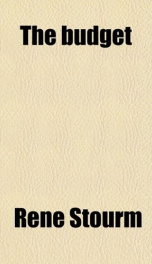the budget

Purchase of this book includes free trial access to www.million-books.com where you can read more than a million books for free. This is an OCR edition with typos. Excerpt from book: Origin Of The Right To Control The Public Purse In The United States The English Parliament extending- its authority over the vast'colonial possessions of North America, decided in 1765 to force these colonies to contribute toward the expenses incurred by the mother country in their protection and defense. For that purpose the House of Commons ordered on its own authority the establishment of the stamp tax (March 8, 1765) in America, which, notwithstanding its dependence, until then had always voted its own taxes. For this reason the minister, George Granville, used the greatest possible prudence in introducing this innovation and he was careful enough to entrust the levying of this new tax to American agents. All seemed quiet in the beginning. But soon the local assembly of Virginia, influenced by one of its members, Patrick Henry, refused to recognize the tax established by the English Parliament in which the American colonies were not represented. The Assembly of Virginia resolved that the "General Assembly of the Colony had the exclusive right and power to impose taxes on its inhabitants." This protest of Virginia was the spark which set the entire nation aflame. Delegates appointed from all parts of the country assembled in congress in New York and declared that every tax paid to the Crown, being a free gift of the people, it would be unreasonable and contrary to the constitution of England that the Parliament of Great Britain should surrender to His Majesty the substance of the colonies. (Oct. 16, 1765.) Thus we see that America plied England with the same arguments that England had used a century before to protect its own liberties against its King.1 On account of the great unrest, Parliament repealed the stamp tax on March 5, 1766, one year after having voted it....
Info about the book
Author:
Series:
Unknown
ISBN:
7810618547
Rating:
4/5 (2)Your rating:
0/5
Languge:
English
Users who have this book
Users who want this book
What readers are saying
What do you think? Write your own comment on this book!
write a commentGenre
if you like the budget try:
Other books by this author
Do you want to exchange books? It’s EASY!
Get registered and find other users who want to give their favourite books to good hands!

